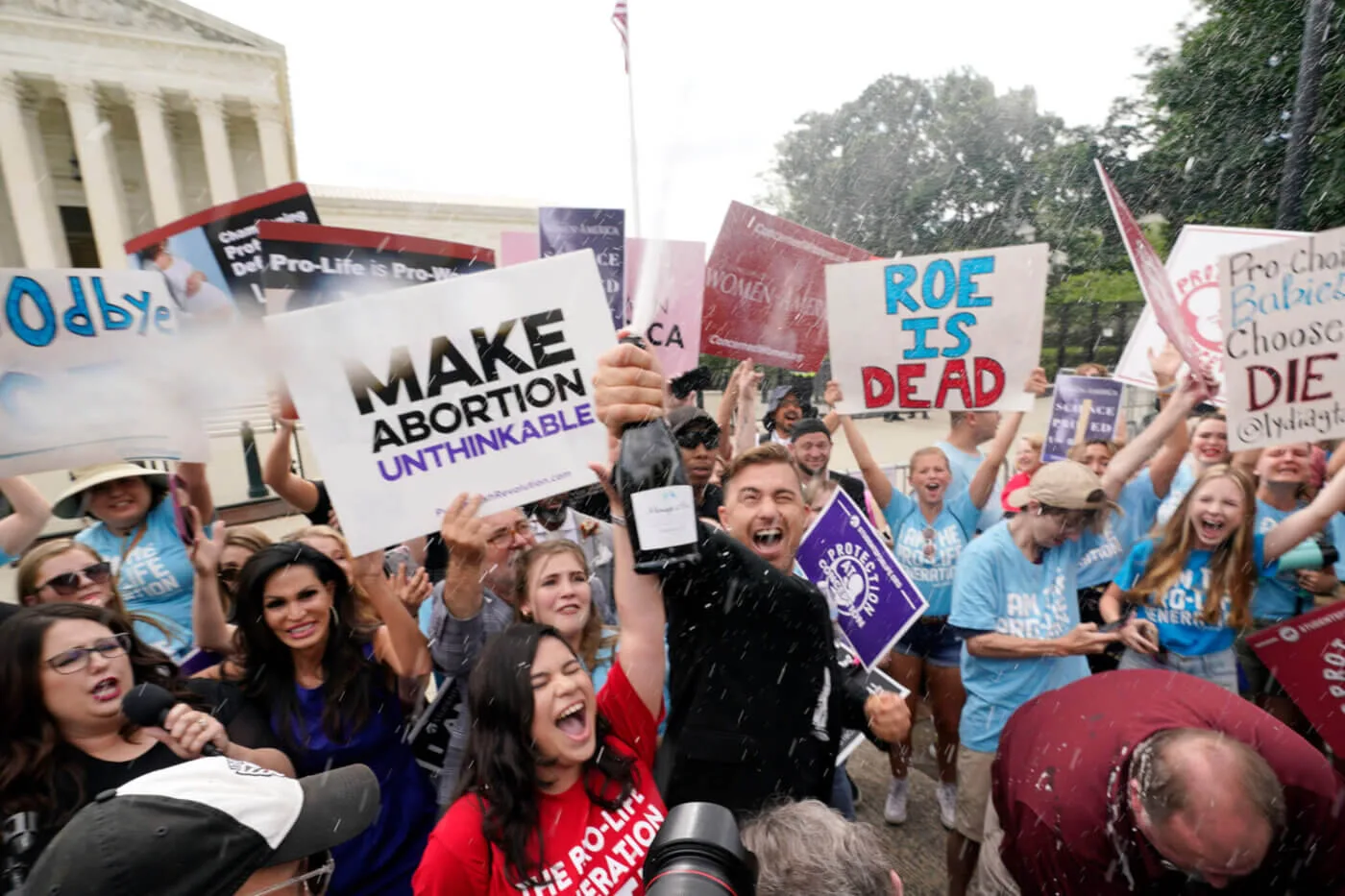
A celebration outside the Supreme Court, Friday, June 24, 2022, in Washington. The Supreme Court has ended constitutional protections for abortion that had been in place nearly 50 years — a decision by its conservative majority to overturn the court's landmark abortion cases. (AP Photo/Steve Helber)
The US Supreme Court’s decision to overturn Roe v. Wade means abortion rights will be determined at the state level. While abortion remains legal in Pennsylvania, the future of reproductive rights in the commonwealth is uncertain.
The US Supreme Court overturned Roe v. Wade by a 6-3 conservative majority decision on Friday.
The ruling came more than a month after the stunning leak of a draft opinion by Justice Samuel Alito indicating the court was prepared to take this momentous step.
Friday’s outcome is expected to lead to abortion bans in roughly half the states.
Now that the federal protection of abortion rights granted by Roe v. Wade that had been in place nearly 50 years has been overturned, the future of reproductive rights in Pennsylvania hinges on the ballot box in more ways than one.
Pennsylvania’s current law on abortion allows for the termination of a pregnancy up to 24 weeks. That does not change with the recent decision by the Supreme Court. Abortion is still legal in the commonwealth.
But for how long depends on who wins the gubernatorial election in November and whether an anti-abortion constitutional amendment is passed. One way or another, the future of abortion rights in Pennsylvania will be decided at the polls.
“In Pennsylvania, we have for a while had a very hostile anti-abortion legislature, when it comes to specifically reproductive and sexual healthcare,” said Lindsey Mauldin, vice president of Advocacy and Public Policy at Planned Parenthood Southeastern Pennsylvania. “But what we’re seeing now is really a boldened attempt to chip away at abortion access from a number of different aspects.”
Governor’s Race
The Republican-majority state Legislature has repeatedly pushed legislation that would limit access to abortion care. Democratic Gov. Tom Wolf’s veto pen has been the last line of defense in the fight for reproductive rights in the commonwealth.
But, as Wolf nears his term limit, the door to the governor’s house in Harrisburg is wide open.
Democratic nominee Josh Shapiro is a vocal supporter of reproductive rights and has continually said he will veto any anti-abortion legislation that comes to his desk if elected.
On the other side of the aisle, Republican nominee and state Sen. Doug Mastriano (R-Franklin) introduced a bill in 2021 that proposed to ban abortions once a fetal heartbeat is detected, roughly six weeks into a pregnancy. He supports a full ban on abortions without exceptions for rape, incest, or the mother’s health.
Constitutional Amendment
Republican lawmakers frustrated with Wolf’s repeated vetoes have found a way around the governor’s pen.
Senate Bill 956 was introduced by Sen. Judy Ward (R-Blair) in January. It proposes amending the state constitution to clarify that there is no right to an abortion or taxpayer funding of abortions within the Pennsylvania constitution. It is currently being considered for vote by the state Senate, and with a GOP majority it’s almost sure to pass.
Democrats have voiced their strong opposition to SB 956.
“Restricting abortion access will not stop them from happening,” Sen. Judy Schwank (D-Berks) said during a committee meeting when the bill was introduced. “It will just make them more dangerous.”
“Every person has a guaranteed right to the reproductive health care they see fit for themselves and their family,” Sen. Amanda Cappelletti (D-Montgomery) said.
Because SB 956 amends the constitution, it will have to win support in the House and Senate in two consecutive sessions. Then it goes straight to a ballot vote, effectively bypassing the governor’s veto pen. The earliest Pennsylvanians could vote on the amendment would be spring 2023.
The only possible chance of the amendment not being passed through the legislature would be if Democrats took over the majority in either house in November’s election. All 203 of the state’s House seats and half of the Senate seats are up for re-election.
Politics

Influencers and creators find new ways to engage young Philadelphia voters
Rec Philly, a space for creators and influencers, teamed up with Show Up Strong to get hundreds of young Philadelphia residents engaged in the...

New Biden rule protects privacy of women seeking abortions
Under the new rules, state officials and law enforcement cannot obtain medical records related to lawful reproductive health care with the goal of...

Biden marks Earth Day by announcing $7 billion in solar grants
The Biden administration on Monday announced the recipients of its Solar For All Program, a $7 billion climate program that aims to lower energy...
Local News

Conjoined twins from Berks County die at age 62
Conjoined twins Lori and George Schappell, who pursued separate careers, interests and relationships during lives that defied medical expectations,...

Railroad agrees to $600 million settlement for fiery Ohio derailment, residents fear it’s not enough
Norfolk Southern has agreed to pay $600 million in a class-action lawsuit settlement for a fiery train derailment in February 2023 in eastern Ohio,...






